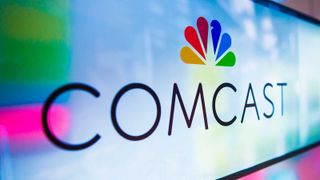Comcast: FCC Must Leave 200 MHz of Interference-Free C-Band for Video

Comcast has told the FCC that it should not try to clear more than 300 MHz of C-band satellite spectrum and to ensure that remaining 200 MHz remains unassailably interference-free turf for the continued delivery of cable network feeds to operators.
That came in response to FCC chairman Ajit Pai's announcement Monday (Nov. 18) that he is proposing an FCC auction of 280 MHz, plus another 20 MHz for a guard band, of the spectrum, leaving 200 MHz in the band for broadcast and cable video delivery.
Related: C-Band Watchers Weigh In
FCC officials speaking on background said the intent is to leave that 200 MHz for video, but Comcast wants to make sure that is the case.
“Comcast has long supported an FCC auction of C-Band spectrum," said Sena Fitzmaurice, senior vice president at Comcast. "We applaud Chairman Pai’s announcement to conduct a public auction for 280 megahertz of C-Band spectrum to ensure that this valuable spectrum is put to use quickly for 5G in an open and transparent manner while preserving the C-Band as a critical input for the delivery of video services. The FCC, as the expert agency, should be in charge of this effort to bring new services to American consumers."
"The Commission should make clear in its final order that it does not and will not propose to reallocate any additional C-Band spectrum beyond 300 megahertz; such assurances are essential to provide certainty to remaining C-Band users that have already faced more than two years of uncertainty about the future of the band," Comcast told the commission.
Related: CBA Offers Open Access 5G Net as Part of C-Band Auction
Multichannel Newsletter
The smarter way to stay on top of the multichannel video marketplace. Sign up below.
The company told the FCC that it is not sure that even 300 MHz can be freed up without "disrupting or degrading video service," but said it is willing to try to avoid that outcome, including by "adopting new compression technologies, higher order modulation, and migrating programming to other services and satellites."
FCC officials conceded on background that compression will probably be necessary to fit the former 500 MHz service into 200 MHz.
Comcast also said that the FCC needs to make sure that cable ops and other earth station operators are "made whole" for their transition.
It also said that it would not work to rely on wireless carriers to "detect and mitigate" interference. "Harmful interference that degrades video services must be resolved in seconds or minutes – programmers and tens of millions of affected consumers cannot endure hours or days waiting for 5G providers to identify and cease interfering transmissions," it said.
Contributing editor John Eggerton has been an editor and/or writer on media regulation, legislation and policy for over four decades, including covering the FCC, FTC, Congress, the major media trade associations, and the federal courts. In addition to Multichannel News and Broadcasting + Cable, his work has appeared in Radio World, TV Technology, TV Fax, This Week in Consumer Electronics, Variety and the Encyclopedia Britannica.

